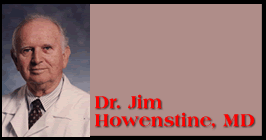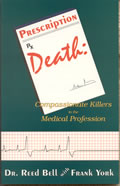Other
Howenstine Articles:
Use of CoQ10
to Treat Malignancies
Why You Should Avoid Taking Vaccines
HOW CAN INTESTINAL BACTERIA INFLUENCE BRAIN FUNCTION?
By Dr. James
Howenstine, MD.
March 10, 2004
NewsWithViews.com
A 14 year old boy suffered from intractable petit mal epilepsy despite visits to many health care practitioners. When started on a preparation of soil based bacteria his seizures promptly ceased. How is this possible?
Yeast are single cell fungi that are normal inhabitants of the intestinal tract. They are greatly outnumbered by healthy intestinal bacteria and cause no problems unless there is a disturbance in this equilibrium. A course of antibiotics which kills the healthy bacteria, cortisone therapy, oral contraceptives, NSAID drugs (Motrin, Clinoril, Relafen etc., pregnancy and a high sugar diet can promote growth of yeast. Following a course of antibiotic therapy the healthy bacteria are greatly diminished and the dangerous yeast, mycoplasma, fungi and anerobic bacteria in the intestinal tract are significantly increased.
The use of antibiotics is also known to inhibit antibody production and phagocytic activity making it easier for candida, fungi, mycoplasma and anerobic bacteria to initiate infection. Additionally, the ingestion of sugar impairs the killing of bacteria for 8 hours. Thus the individual who is eating processed foods, nearly all of which contain sugar, has a significantly impaired ability to fight off an infection.
Research has shown that vaginal infections with yeast are nearly impossible to eradicate unless attention is directed to the intestinal pool of candida where the vaginal candida infection originated. When a yeast infection (candida) becomes established the yeast organisms release substances that stop the proliferation of lymphocytes which is a key part of the immune response (mannan). The sera of women with established candida infections have a reduced to absent response to candida antigens (underactive immune system). Unless therapy is directed to eradicating intestinal candida vaginal candidal (yeast) infection will persist.
Candida are highly allergenic. Approximately 26 % of individuals with chronic urticaria (hives) improved when anti-candidal therapy and a low sugar and yeast diet was introduced. Multiplication of candida occurs when antibiotics, oral contraceptives, high sugar diet, pregnancy, NSAID (motrin, clinoril, relafen etc) and cortisone therapy enters a patients life. Many persons with yeast infection have an intense craving for sugar. Children with candida problems often have hyperactive behavior after indulging in sweets. An increase in candida population in the intestines after antibiotic therapy appears to cause a colon sensitivity to the increased numbers of candida which may produce symptoms of irritable bowel syndrome (diarrhea and constipation with cramping pain).
The proliferation of candida, fungi, mycoplasma and dangerous anerobic bacteria in the intestines following antibiotic therapy has hazardous side effects. These four types of organisms all release toxic substances which can penetrate the poorly functioning intestinal wall (not enough protective bacteria) to spread by the blood stream throughout the body. These toxic substances are thus able to cause symptoms in the brain (seizures, confusion, poor memory, depression, learning difficulties, irritability, headaches and short attention span).
Persons with candida (yeast) infection have many associated problems:
-
Disturbances in the endocrine system are frequent. Premenstrual syndrome, irregular menstrual periods, and underactive thyroid function often promptly respond to sugar restriction and anti-candida therapy.
-
Food allergies are very frequent and learning the culprits often produces significant benefit. Very high doses of Vitamin C may improve the allergy problem.
-
A history of prolonged or frequent courses of antibiotics is routine.
-
Intractable bladder and vaginal infections are very common.
-
The patient frequently is aware of serious sensitivity to chemicals, formaldehyde, perfumes, pesticides, detergents, floor wax, mold, animal dander, and smoke.
-
The immune system fails to handle infections normally until the candida excess is corrected. Nasal yeast may appear after intranasal cortisone therapy.
-
Serious depression often clears after eradication of intestinal yeast.
-
Multiple sclerosis, Crohn's Disease, systemic lupus erythematosus, psoriasis, and thrombocytopenic purpura often exhibit considerable improvement when the associated yeast problem is corrected.
-
Drunken behavior can occasionally be seen when the yeast manufacture large quantities of alcohol which becomes absorbed from the intestines.
-
Some persons with autism improved when their candida problem was cleared.
Therapy can be successful using garlic, caprylic acid, Nystatin, Amphotericin (orally), Ketoconazole, Sporonox, or Diflucan. These agents are often needed for long periods of time and must be combined with avoidance of sugar and yeast containing foods if the individual is allergic to yeast.
For much more information about yeast read Dr. William C. Crook's book The Yeast Connection.
© 2004 Dr. James Howenstine - All Rights Reserved
Dr.
James Howenstine is a specialist in internal medicine. He is author of
the book A Physicians Guide To Natural Health Products That Work 328
pg. $17.95. This book can be ordered from Amazon.com, naturalhealthteam.com,
and by calling 1-800-416-2806. Dr. Howenstine can be reached at jimhow@racsa.co.cr
and by writing Dr. James Howenstine, C/O Remarsa USA SB 37, P.O. Box
25292, Miami, Fl. 33102-5292
"Research has shown that vaginal infections with yeast are nearly impossible to eradicate unless attention is directed to the intestinal pool of candida where the vaginal candida infection originated."






